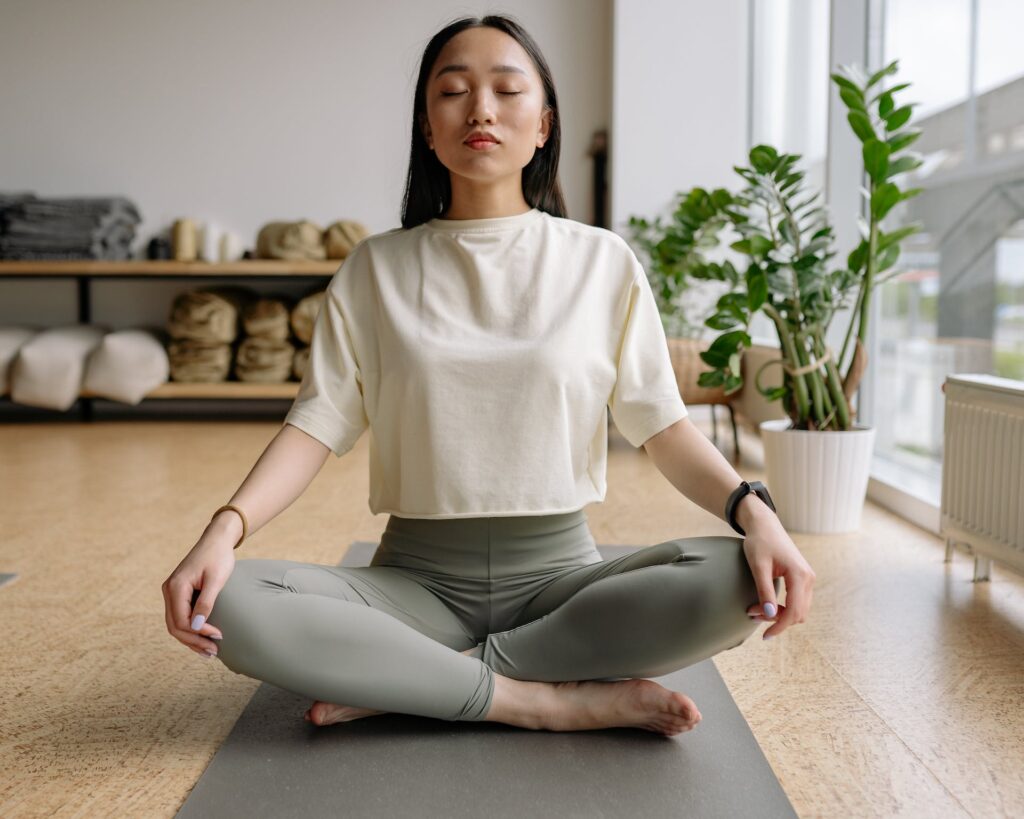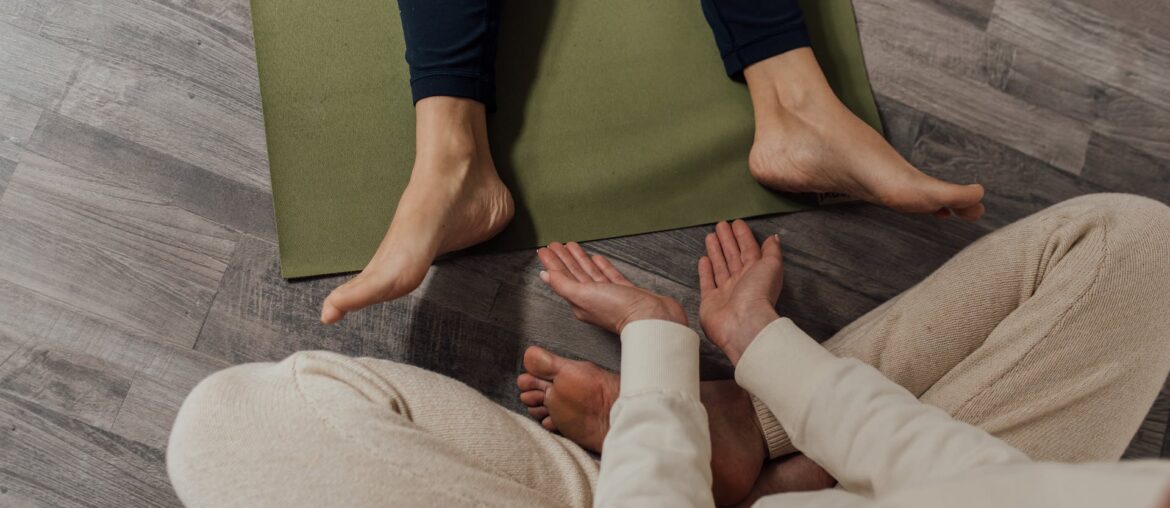Rebekka's approach is strongly influenced by mindfulness practices, recognizing the mind-body connection. She works in a trauma-informed, culturally sensitive, feminist and holistic way. Diploma: M.A. Clinical and Health Psychology, ELTE, Budapest
Last Updated on February 28, 2024 by It’s Complicated
It’s been eight years since I took my first yoga teacher training. Eight years since my yoga mat has had my back, both literally and figuratively.
Having that safe space to return to again and again has been an incredibly powerful tool for my own healing when life throws curveballs.
While I don’t believe everyone has to do yoga, I do believe in the power of a regular practice and its ability to support our mental health.
Here are five ways yoga can support your mental health and contribute to your own healing journey:
1. A daily centering practice
My yoga practice didn’t become a daily routine until after I completed my teacher training. We all need something to anchor us in the present moment. A chance to check in with ourselves — body, mind, and spirit. Something to ground us in the here and now.
As Laura van Dernoot Lipsky, author of the book Trauma Stewardship, puts it, a daily practice “leads us inside to our core, where we center ourselves, and then, gracefully, leads us back out, renewed in a way that allows us to engage with the outside world at our best.“
Coming to the mat to ground and center ourselves in the here and now can help us step off the mat with a sense of presence for ourselves and, therefore, others.
2. Understanding that you’re worthy
While specific yoga practices target your physical health, your mental and emotional health benefit, too.
In a way, returning to your mat again and again helps you train the muscle of caring for yourself.
As you keep taking the time out of your day to practice, you signal to your mind that you’re worthy of being taken care of, too.
This time for yourself is a message. It says:
You matter, too. You are enough. You have the right to rest. You’re allowed to take care of yourself first. You don’t have to earn your worth. Your needs are important. And you deserve to be appreciated exactly the way you are.

3. Checking in with how you really feel
Your yoga mat and the time you spend there can become an opportunity to check in with yourself regularly. You can ask yourself and notice:
How’s my body doing today? Does the right side of my body feel different from the left? Am I more or less flexible than yesterday? Just notice. Can you be present with what’s there today instead of judging your experience?
How’s my mind? Do I easily get distracted today? Does my mind wander to what I need to do after I get off my mat, or can I pay attention to the bodily sensations and my breath? Do I judge my body for how it moves today, or can I bring some kindness to the poses?
And how am I on an emotional level? How’s my heart? Do the physical poses bring up emotions that want to be seen or released? Let the Asanas help you move through anything that arises by becoming aware of how your heart feels today.
4. Foster self-compassion
The first tenet of the ten ethical principles, the “do’s and don’ts” of yoga that lay the moral foundation of our practice and encourage us to bring awareness and presence to life off the mat, is called Ahimsa.
This translates to non-harming or nonviolence — in thought, word, and deed.
While yoga has a way of confronting us with our limitations, it can also gently invite us to respect them. When self-judgment and self-criticism arise, yoga teaches us to notice them and make room for them.
For me, this is an active act of self-compassion. In practicing self-compassion, we give ourselves the same care and kindness we’d give to a good friend.
Finding understanding for how your body can and can’t move and learning to be gentle with yourself can be a great gift that you may see unfold off the mat, too.
Seeing yoga as a way of finding compassion for yourself can help you understand that you deserve the same kindness you show others.
You may even close your yoga practice with a short loving-kindness meditation like this one, whispering to yourself:
May I be kind to myself. May I be happy. May I be healthy. May I be free from all suffering. May I accept myself just as I am.

5. Supporting your specific mental health challenge
Slowly, yoga teachers are starting to appreciate the role this ancient practice can play in supporting specific mental health challenges.
While word’s been out for a while now that yoga can reduce stress, ease anxiety, and relieve depression, trauma-sensitive yoga as well as yoga for high sensitivity and burnout are some of the specializations that are now slowly starting to emerge.
Somatic yoga in particular is a gentle form of yoga that allows us to listen to our body and its needs in a way that respects our current struggles, re-integrating the connection between body and mind with small, slow and gentle movements.
Finding classes specifically tailored for your mental health struggles or working with a therapist who incorporates yoga or other somatic approaches can be an invaluable step on your own healing journey.
What’s next?
If you’d like to explore how yoga can support your own mental health, here are your next steps:
- For a home practice, search for somatic yoga or yoga classes specifically tailored for your mental health struggles, for example here or here.
- If you’re interested in using yoga or other somatic approaches to support your mental health in a more personalized way, search for therapists like myself or my colleagues who work with these tools on It’s Complicated.
- If you’re a mental health professional yourself and would like to start incorporating yoga into your therapy and counseling space, make sure to check out this free training series by Deniz Aydoslu and get in touch with me to receive a discount for our Yoga for Mental Health Teacher Training.
Further education
https://www.somaticyogaformentalhealth.com/pages/teach-yoga-for-mental-health
Resources and Sources
Yoga for Mental Health videos on Youtube by Deniz Aydoslu or Adriene Mishler
Book Trauma Stewardship by Laura van Dernoot Lipsky
https://kripalu.org/resources/yoga-self-compassion-and-accepting-inner-critic
https://www.ncbi.nlm.nih.gov/pmc/articles/PMC5843960/
Advantages of Discovering Your Therapist via It’s Complicated
- No Setup Costs: Creating an account and reaching out to therapists is entirely cost-free.
- Transparent Pricing: You’ll only pay the session fee, with no concealed booking fees.
- Precise Search: Utilize our robust search tool to pinpoint therapists based on your specific preferences.
- Thorough Listings: Easily explore therapists categorized by their specialty, approach, location, and language.
Built for therapists, by therapists, It’s Complicated is the only international counselling platform that doesn’t just help people find the right therapist, but also supports the therapists in their craft of helping others. With GDPR-compliant video software, encrypted messaging, and easy invoicing, It’s Complicated is the only tool you need to do therapy. If you are in a crisis use instead one of these resources.





